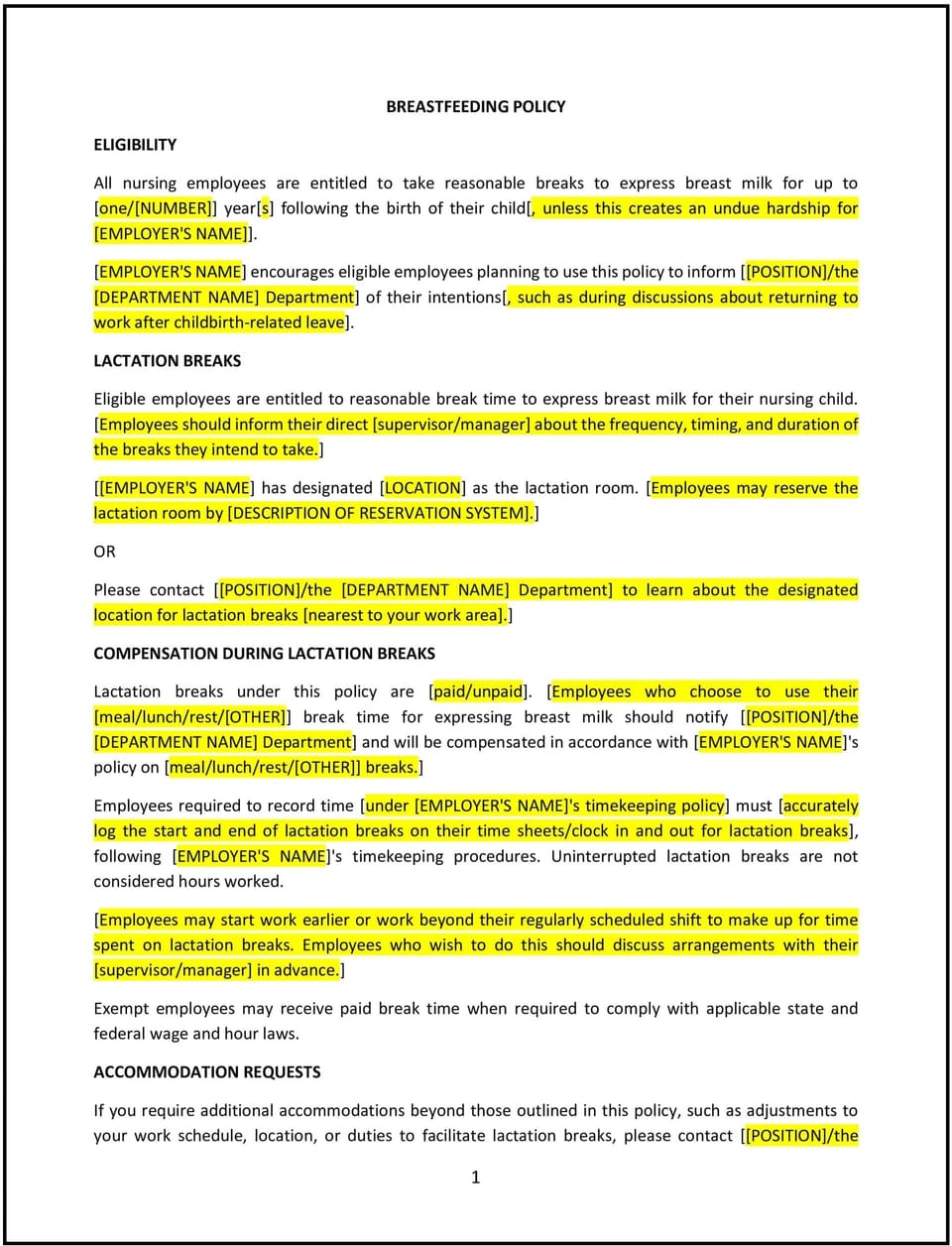Breastfeeding break policy (Alabama): Free template

Breastfeeding break policy (Alabama)
A breastfeeding break policy ensures that nursing employees have the time and space to express breast milk during work hours, supporting their health and well-being. In Alabama, this policy helps businesses comply with federal laws such as the Fair Labor Standards Act (FLSA) while addressing the unique needs of employees in different industries. Customizing this policy demonstrates your organization’s commitment to supporting working parents and maintaining a family-friendly workplace.
How to use this breastfeeding break policy (Alabama)
- Define employee rights: Clearly state that eligible nursing employees have the right to take reasonable breaks to express breast milk.
- Specify accommodations: Outline the requirements for providing a private, non-bathroom space for breastfeeding or pumping.
- Include scheduling details: Explain how employees should coordinate breaks with their manager to minimize workplace disruption.
- Address duration: Indicate the time frame for breastfeeding accommodations, typically up to one year after childbirth, or longer if your policy allows.
- Communicate inclusivity: Ensure all employees are aware of this policy and its importance in fostering a supportive work environment.
Benefits of using a breastfeeding break policy (Alabama)
A breastfeeding break policy supports nursing employees and promotes a healthier workplace. Here's how it helps:
- Ensures compliance: Aligns with federal requirements under the FLSA and demonstrates your organization’s commitment to legal standards.
- Supports employee well-being: Provides nursing mothers with the resources they need to balance work and family responsibilities.
- Enhances retention: Helps retain talented employees by fostering a supportive and family-friendly workplace.
- Reduces absenteeism: Encourages better health outcomes for mothers and infants, reducing time away from work.
- Promotes inclusivity: Creates a workplace culture that values diversity and family needs.
Tips for using a breastfeeding break policy (Alabama)
- Provide private spaces: Ensure designated breastfeeding areas are clean, private, and free from interruptions, meeting Alabama’s legal requirements.
- Offer flexible scheduling: Allow nursing employees to adjust their break times based on individual needs.
- Consider industry-specific needs: In industries like manufacturing or retail, plan accommodations that fit operational requirements without compromising employee rights.
- Address rural workplaces: For Alabama’s rural businesses, explore creative solutions like converting unused offices into lactation spaces.
- Train supervisors: Educate managers on how to support nursing employees and handle accommodation requests with sensitivity.
Q: Are employers in Alabama required to provide breastfeeding breaks?
A: Yes, under federal law (FLSA), employers must provide reasonable breaks and private spaces for nursing employees, though Alabama does not have additional state-specific laws.
Q: How many breaks can an employee take for breastfeeding?
A: The FLSA requires reasonable breaks, which may vary based on the employee’s needs and work schedule.
Q: Can breastfeeding breaks be unpaid?
A: Yes, under federal law, breaks can be unpaid unless they coincide with already paid breaks.
Q: What constitutes a private space for breastfeeding?
A: A private space is a non-bathroom area that is shielded from view and free from interruptions, such as an unused office or dedicated lactation room.
Q: How should employees request breastfeeding accommodations?
A: Employees should notify their manager or HR in advance to arrange suitable break times and spaces.
This article contains general legal information and does not contain legal advice. Cobrief is not a law firm or a substitute for an attorney or law firm. The law is complex and changes often. For legal advice, please ask a lawyer.


